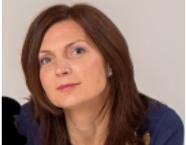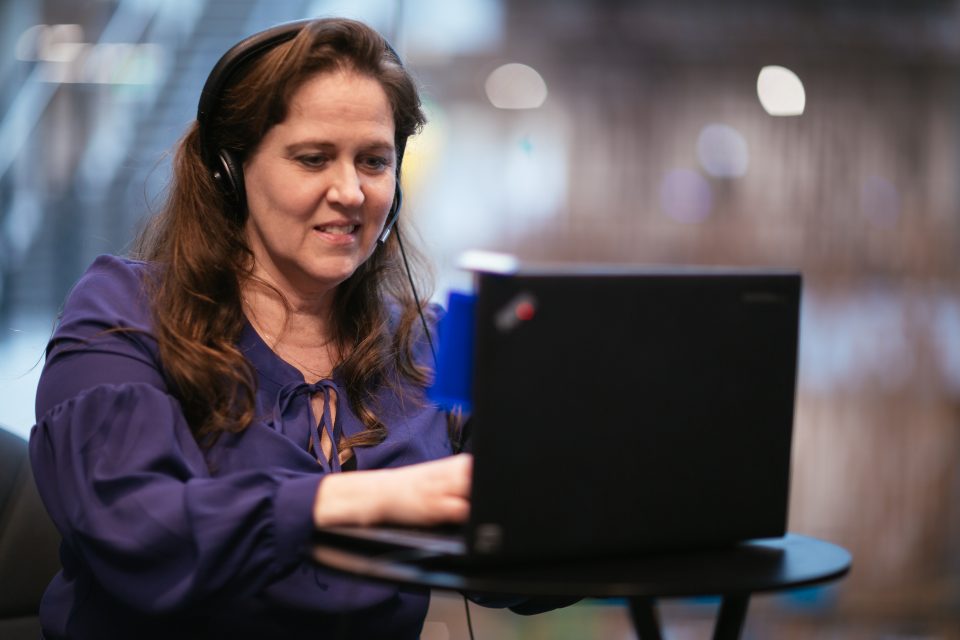On Wednesday, 22nd of March, Microsoft organized the online event “Innovation for Accessibility Forum“. The aim of the event was to gather the representatives of the Estonian, Latvian, and Lithuanian Governments, and Public and Commercial sectors to discuss different initiatives regarding accessible digital solutions, as well as legislation compatibility with the European Accessibility Act.
 With more than 1 billion people with disabilities in the world, Microsoft believes that accessibility is essential to delivering on the mission to “empower every person and every organization on the planet to achieve more”. According to Michalis Moschos, Global Partner Solutions Director for Go to Market and Accessibility Lead for Microsoft in Central and Eastern Europe, technology is developing to provide more accessible opportunities for all people. If only 1 in 10 people who are experiencing a form of disability have access to the assistive technology they need, it means that the majority can’t fully participate in our economies and societies. The Disability divide, as Mr. Mochos explained, is the gap in societal inclusion for people with disabilities that includes education, employment, and access to technology. „As a company, Microsoft has four focus areas that it commits to in order increase the effort on accessibility,” he stated. „These are the technology, as we are continuously developing new technologies to make everything more accessible to people with disabilities; the people, as we ask ourselves how we can expand the opportunities for people with disabilities to be better at school, at home, at work. This is followed by partnerships, because a company or an organization cannot solve the accessibility issue itself, it needs to partner with others, to be challenged and to learn from each other. The last one is the policies – we aim to institutionalize and make this a fundamental right of the community and society.”
With more than 1 billion people with disabilities in the world, Microsoft believes that accessibility is essential to delivering on the mission to “empower every person and every organization on the planet to achieve more”. According to Michalis Moschos, Global Partner Solutions Director for Go to Market and Accessibility Lead for Microsoft in Central and Eastern Europe, technology is developing to provide more accessible opportunities for all people. If only 1 in 10 people who are experiencing a form of disability have access to the assistive technology they need, it means that the majority can’t fully participate in our economies and societies. The Disability divide, as Mr. Mochos explained, is the gap in societal inclusion for people with disabilities that includes education, employment, and access to technology. „As a company, Microsoft has four focus areas that it commits to in order increase the effort on accessibility,” he stated. „These are the technology, as we are continuously developing new technologies to make everything more accessible to people with disabilities; the people, as we ask ourselves how we can expand the opportunities for people with disabilities to be better at school, at home, at work. This is followed by partnerships, because a company or an organization cannot solve the accessibility issue itself, it needs to partner with others, to be challenged and to learn from each other. The last one is the policies – we aim to institutionalize and make this a fundamental right of the community and society.”
 Esa Kaunistola, Director, Trade and Industrial Policy at Microsoft, European Government Affairs, further explained the significance of European Accessibility Act (EAA) implementation and what it brings to the Baltics. The EAA aims to bring benefits to businesses, people with disabilities and the elderly. “Microsoft has been continuously supporting European institutions and their efforts to ensure inclusion and accessibility for all which started with the European Union’s efforts to implement the United Nations convention on the rights of persons with the disabilities, and that has resulted in the adoption of the European Accessibility Act”, Mr. Kaunistola said. The EAA is an important part of our journey to include everybody, particularly the people with disabilities in the modern society. „The requirements of European Accessibility Act will go into effect in 2025 but now it is time to prepare for the implementation”, he concluded.
Esa Kaunistola, Director, Trade and Industrial Policy at Microsoft, European Government Affairs, further explained the significance of European Accessibility Act (EAA) implementation and what it brings to the Baltics. The EAA aims to bring benefits to businesses, people with disabilities and the elderly. “Microsoft has been continuously supporting European institutions and their efforts to ensure inclusion and accessibility for all which started with the European Union’s efforts to implement the United Nations convention on the rights of persons with the disabilities, and that has resulted in the adoption of the European Accessibility Act”, Mr. Kaunistola said. The EAA is an important part of our journey to include everybody, particularly the people with disabilities in the modern society. „The requirements of European Accessibility Act will go into effect in 2025 but now it is time to prepare for the implementation”, he concluded.
Government and public sector representatives from Baltic countries were invited to share their views on accessibilty; Elīna Celmiņa, Deputy State Secretary, Ministry of Welfare of the Republic of Latvia, Pauls Puķītis, Information and communication technology development policy coordinator, Ministry of Environmental Protection and Regional Development of the Republic of Latvia, Rasmus Eimla, Product Owner at Riigi Infosüsteemi Amet, Estonian Information System Authority, and Erika Kuročkina, an Adviser to the Minister at the Ministry of the Economy and Innovation of the Republic of Lithuania. They talked about accessibility solutions they have already adopt or are planning to implement, and how they enable with disabilities worldwide to use digital products and services. The panelists discussed what will the European Accessibility act bring and how will the government help companies adjust their businesses.

 According to Elīna Celmiņa from the Ministry of Welfare of Latvia with the new Law being adopted last week, Latvia is one step closer to the transposition of the directive in total. The EAA requirements are transposed in five different laws in Latvia, not only the Law on Accessibility of Products and Services but also Low on Conformity Assessment, Law on Electronic Communications and two Laws on Procurement Procedures. Elina added that business sector has been welcoming the new Law and showing support. Her team is currently focusing on drafting the Rules of Cabinet of Ministers on requirements as regards information, web pages, mobile apps, call centre etc. and making necessary input to channel the legislative requirements to local authorities, enterprises, and small and medium businesses so that they can design suitable digital services.
According to Elīna Celmiņa from the Ministry of Welfare of Latvia with the new Law being adopted last week, Latvia is one step closer to the transposition of the directive in total. The EAA requirements are transposed in five different laws in Latvia, not only the Law on Accessibility of Products and Services but also Low on Conformity Assessment, Law on Electronic Communications and two Laws on Procurement Procedures. Elina added that business sector has been welcoming the new Law and showing support. Her team is currently focusing on drafting the Rules of Cabinet of Ministers on requirements as regards information, web pages, mobile apps, call centre etc. and making necessary input to channel the legislative requirements to local authorities, enterprises, and small and medium businesses so that they can design suitable digital services.
 Pauls Puķītis pointed that society is already using accessible technology in everyday life even not realising it was developed to help people with disabilities – the typewriter was originally meant for blind people, messages were invented for deaf people, subtitles and voice recognition are developed as well. “The society wants their environment more accessible”, Mr. Puķītis concluded.
Pauls Puķītis pointed that society is already using accessible technology in everyday life even not realising it was developed to help people with disabilities – the typewriter was originally meant for blind people, messages were invented for deaf people, subtitles and voice recognition are developed as well. “The society wants their environment more accessible”, Mr. Puķītis concluded.
 Estonia is already known as the leader in digital development and has proven that it is possible to redesign public services that are easy to use by many people. Rasmus Eimla talked about the use of state Virtual Assistant – Burokratt, the Estonian AI projects which is listed in the global top 100 by UNESCO. He explained how the Estonian people benefit from Burokratt by finishing everything in more effective way, and he shared the future plans in expanding its features, such as implementing “the speech to text” and “text to speech” and sign language, as well.
Estonia is already known as the leader in digital development and has proven that it is possible to redesign public services that are easy to use by many people. Rasmus Eimla talked about the use of state Virtual Assistant – Burokratt, the Estonian AI projects which is listed in the global top 100 by UNESCO. He explained how the Estonian people benefit from Burokratt by finishing everything in more effective way, and he shared the future plans in expanding its features, such as implementing “the speech to text” and “text to speech” and sign language, as well.
Erika Kurčokina, from the Ministry of the Economy and Innovation of the Republic of Lithuania, said that her country is facing the language barrier issue, while pointing that the digital literacy is prerequisite for successful digital transformation. There is a great need for digitalization and AI application, but the society needs to be prepared for the use of this type of products. It is important to collaborate at all levels in order to have success in implementing EAA or any other initiative.
The panellists agreed that there are certain challenges to overcome in all three Baltic countries, such as society aging. „Disability applies to all vulnerable groups, to more elderly people, too, with the general longer life expectancy”, Ms. Kuročkina said. „These people are usually behind in knowledge and use of digital solutions, so skilling them is also important task of government institutions.”
Kaspars Kauliņš International Business Development Director from Tilde, Siim Lepisk Head of Innovation from Net Group and Microsoft Development Centre representative Solomiya Branets shared some examples of accessibility solutions and their cooperation with Microsoft.
 Tilde is a leading European language technology company that develops AI-empowered machine translation and speech technology, as well as multilingual virtual assistants. Kaspars Kauliņš shared that his company has developed a speech synthesis solution that allows people to read physical books, tools to make websites accessible to people with disabilities – multilingual options and adding voice to the website content, including image descriptions, automatic subtitling for video content etc. One of the most recent initiatives is a solution that helps pupils with hearing impairments. „In light of the European Accessibility Act, Tilde is developing real-time online subtitling for electronic media and web content. We are already working with companies and institutions to experiment with online subtitling for national broadcasters, and we aim to extend this service to our home markets in Estonia and Lithuania”, he added. „Our goal is to ensure that both public and private organizations in the Baltics have access to services that provide multilingualism, speech synthesis for audio, speech recognition for subtitling of video content, and real-time subtitling and voice-over for electronic media. Our approach also includes the application of large language models to human-machine interaction, particularly in the area of accessibility. This is an area that is still being investigated, and we are in the early stages of its development”, Kaspars concluded.
Tilde is a leading European language technology company that develops AI-empowered machine translation and speech technology, as well as multilingual virtual assistants. Kaspars Kauliņš shared that his company has developed a speech synthesis solution that allows people to read physical books, tools to make websites accessible to people with disabilities – multilingual options and adding voice to the website content, including image descriptions, automatic subtitling for video content etc. One of the most recent initiatives is a solution that helps pupils with hearing impairments. „In light of the European Accessibility Act, Tilde is developing real-time online subtitling for electronic media and web content. We are already working with companies and institutions to experiment with online subtitling for national broadcasters, and we aim to extend this service to our home markets in Estonia and Lithuania”, he added. „Our goal is to ensure that both public and private organizations in the Baltics have access to services that provide multilingualism, speech synthesis for audio, speech recognition for subtitling of video content, and real-time subtitling and voice-over for electronic media. Our approach also includes the application of large language models to human-machine interaction, particularly in the area of accessibility. This is an area that is still being investigated, and we are in the early stages of its development”, Kaspars concluded.
 Net Group is a business and software development company that operates across the EMEA region, providing profitable and scalable digital solutions. Bürokratt, their virtual assistant solution, has already been successfully implemented in Estonia. Bürokratt is a sophisticated system capable of handling a wide range of requests, including technical and police-related issues.
Net Group is a business and software development company that operates across the EMEA region, providing profitable and scalable digital solutions. Bürokratt, their virtual assistant solution, has already been successfully implemented in Estonia. Bürokratt is a sophisticated system capable of handling a wide range of requests, including technical and police-related issues.
Net Group is also working on more complex and specific niche areas, such as medical text processing. “Our system can categorize medical topics in a very medicine-specific and machine-readable way, which can be used by computers to provide suggestions for health improvement,” Siim Lepisk shared.
Net Group is committed to innovation and accessibility, especially in the government and telecom sectors. Lepisk emphasized the importance of structuring data and systems in a machine-readable way to overcome language barriers and offer scalable solutions globally. “To achieve our goal of offering scalable solutions beyond borders, we need the support of local governments and Microsoft services,” he said. Net Group strives to provide profitable and scalable digital solutions that are accessible to all, leading the industry through their innovative products and dedication to accessibility.
 Solomiya Branets an AI & Machine Learning Product Manager in Microsoft Development Centre in Estonia, pointed out that Microsoft offers design guidelines and principles for creating accessible user interface (UI) that works well with assistive technologies, and mentioned the accessible solutions that the company offers such as Windows Narrator. „Immersive Reader is a tool that helps users read and comprehend text across Microsoft apps, Voice assistants allow to interact with apps, Accessibility check for slides or documents. In Microsoft Teams there are captions and transcription, their translation, and high contrast mode for slides,” Ms. Branets shared. When it comes to AI, the testing is even more extensive. There are often more than 50 languages in test and 70 different speech impairments, to make sure that the AI system doesn’t mix different noise for voice. “There is the additional process called Responsible AI process, where different teams such as legal department or privacy team, along with development team try to find gaps in the system. This is the way to make sure that the system will work for everyone”.
Solomiya Branets an AI & Machine Learning Product Manager in Microsoft Development Centre in Estonia, pointed out that Microsoft offers design guidelines and principles for creating accessible user interface (UI) that works well with assistive technologies, and mentioned the accessible solutions that the company offers such as Windows Narrator. „Immersive Reader is a tool that helps users read and comprehend text across Microsoft apps, Voice assistants allow to interact with apps, Accessibility check for slides or documents. In Microsoft Teams there are captions and transcription, their translation, and high contrast mode for slides,” Ms. Branets shared. When it comes to AI, the testing is even more extensive. There are often more than 50 languages in test and 70 different speech impairments, to make sure that the AI system doesn’t mix different noise for voice. “There is the additional process called Responsible AI process, where different teams such as legal department or privacy team, along with development team try to find gaps in the system. This is the way to make sure that the system will work for everyone”.
 During the Forum, the importance of accessibility matter has been recognized, the governments and companies shared their stories, talked about solutions and tools, and about future plans and initiatives. In the end, Vaida Sapole, pointed that accessibility matter needs to stay on top of everyone’s mind, and excluded the option to wait for European Accessibility Act to become valid in 2025. „There is no time like the present to change our world, so let’s start right now and make it better for everyone – Let’s move forward by developing new solutions, new products and delivering services with accessibility in mind”, Vaida Sapole Country manager for Baltic region at Microsoft, concluded.
During the Forum, the importance of accessibility matter has been recognized, the governments and companies shared their stories, talked about solutions and tools, and about future plans and initiatives. In the end, Vaida Sapole, pointed that accessibility matter needs to stay on top of everyone’s mind, and excluded the option to wait for European Accessibility Act to become valid in 2025. „There is no time like the present to change our world, so let’s start right now and make it better for everyone – Let’s move forward by developing new solutions, new products and delivering services with accessibility in mind”, Vaida Sapole Country manager for Baltic region at Microsoft, concluded.
The power of technology lies in solving challenges. Microsoft will continue to create accessible tools and solutions and continue to participate in the discussions on how governments, organizations, and businesses can transform themselves to be ready to provide opportunities to everyone with any disabilities.





